NRL 1999 grand final: Storm, Dragons stars break down controversial decider and the infamous Craig Smith penalty try
Twenty five years on from one of the most dramatic grand finals in rugby league history, the stars break down the controversial 1999 decider, and the infamous Craig Smith penalty try.
NRL
Don't miss out on the headlines from NRL. Followed categories will be added to My News.
Craig Smith was the hero of the Melbourne Storm’s famous premiership win in 1999 but sepia-toned memories and immense pride are all he has to show for one of the greatest moments of his life.
The premiership ring that Smith was awarded that day was stolen from a safe inside his house when he was living in Perth three years ago.
So too the jersey, stained with blood, that he was wearing in the dying minutes when St George Illawarra winger Jamie Ainscough cleaned him up and gave away a penalty try that levelled the scores at Accor Stadium.
Smith was on a goalkicking streak heading into the grand final but the kick to win the game, from in front of the posts, was handed to Matt Geyer because Smith was in Disneyland.
We’ll get to that soon enough. First of all, let’s talk about the ring and jersey that was taken from Smith in a brazen robbery a few years back.
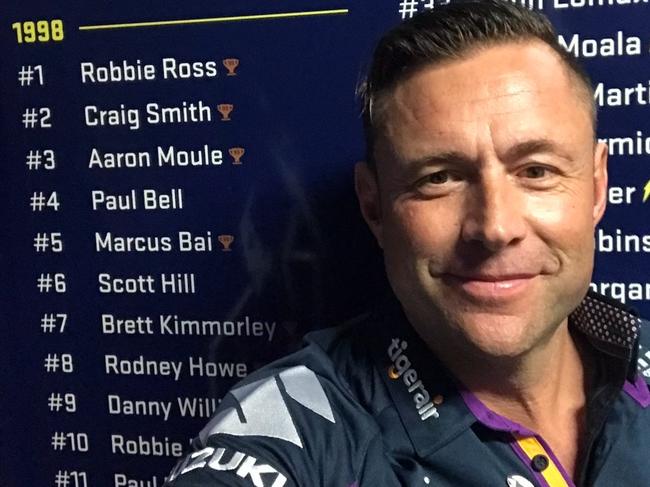
Smith and good mate and fellow premiership winner Ben Roarty would wear their rings with pride every time they attended a Storm game.
It was a reminder of the most memorable day of their sporting lives. So too the jersey that he couldn’t bring himself to wash.
Along with passports and keepsakes from his grandparents, they were stolen from Smith’s Perth home when robbers broke into a safe and absconded.
“I was moving back to Melbourne at that stage,” Smith said.
“I had moved everything out of the house and that was last thing I needed to pack up. I went back in the morning and it had been ripped out of floorboards.
“I had my jersey that had the blood on it and passports and grandparents sentimental things that were worth nothing.
“They both unbolted a safe out of my house over there. Never got it back.
“I wore (the ring) all the time. I do miss it because it was something – a good mate of mine Ben Roarty — we wore it all the time when we went to the games with pride.
“Some junkie’s probably traded it in now or melted it down because if it was me, I wouldn’t wear someone else’s pride.”
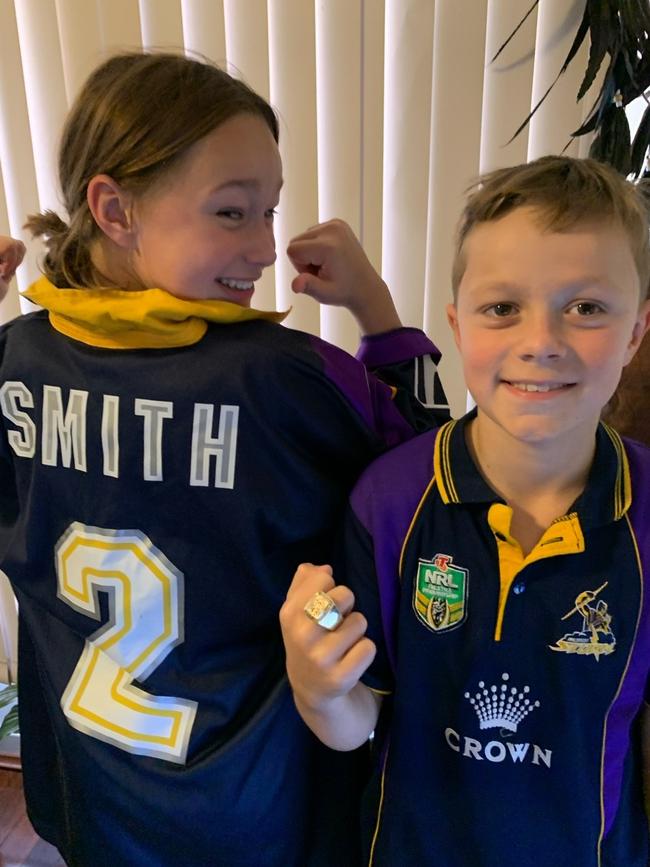
Smith has priced a replacement and has all but given up hope of ever getting the ring back. The jersey too.
The one thing the robbers couldn’t take from him was his memories of that day and they remain as strong as ever despite being on the receiving end of the high shot from Ainscough that has become part of rugby league folklore.
As the Storm prepare for another grand final on Sunday night at Accor Stadium, this is the story of the 1999 decider through the eyes of those who were involved in one of the most famous – and controversial – grand finals in history.
THE PAIN
“People don’t generally remember who finished second. Well, they do in 1999.”
With those words you can still hear the heartache in then St George Illawarra coach David Waite’s voice.
Twenty five years on from one of the most dramatic grand finals played in front of a record 107,999 crowd at Sydney Olympic Park, the pain is still raw for Dragons figures.
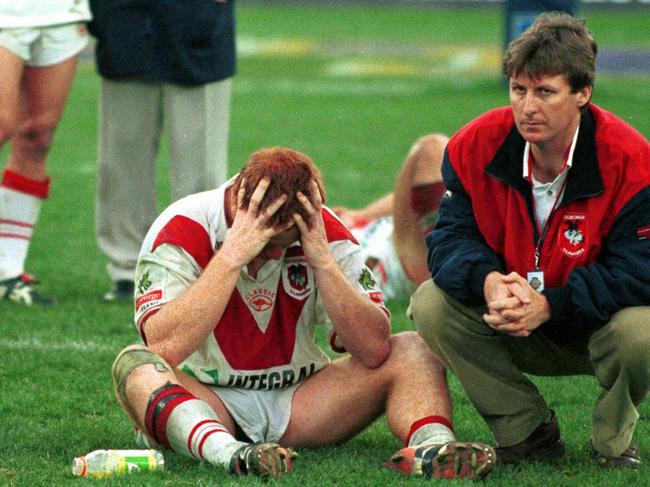
They entered the match full of confidence.
The first year of the joint venture had produced a near fairytale season following St George and Illawarra creating a partnership at the end of 1998.
“We were more than confident that we believed we were capable of fighting for the title,” Waite said of his aspirations in 1999.
“Everything else would’ve been a failure.”
They had beaten the Storm convincingly 34-10 in the opening week of the finals before beating the Roosters and Cronulla to make it to the decider.
They had also beaten the Storm 28-16 in round 13. Both of those wins were in Melbourne.
“We always had Melbourne’s measure back in those days,” star five-eighth Anthony Mundine said.
“The grand final is the only time they beat us. They weren’t the better team that year. I felt we were the best team.”
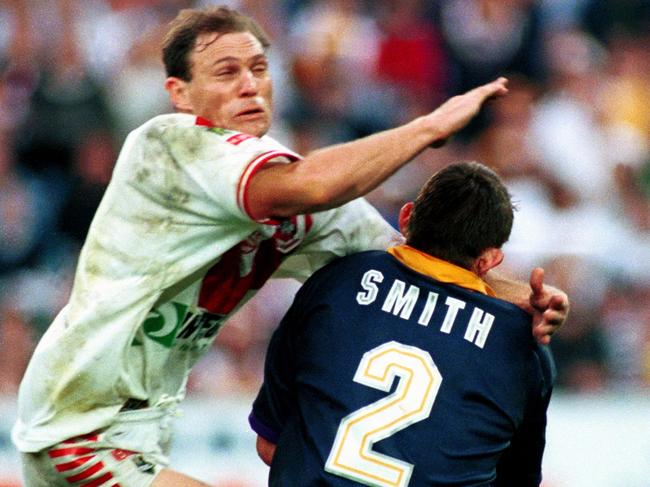
THE HERO
Smith was ready to retire heading into the later stages of the 1999 season.
He had played the majority of games the year before but the premiership season was a wasteland until the finals arrived.
So convinced was Smith that his career was over, he opted to listen to their opening game of the finals against St George Illawarra on a radio at the MCG while downing some drinks.
The next day he turned up at training and his life took a twist that would result in him becoming a part of rugby league history.
“I had some great times there, but I was ready to retire,” Smithy said.
“It was all over when I got the tap on the shoulder. I was pretty much a tackling bag at practice. I was done.
“Actually, when I got the tap on the shoulder, I can say it now, I was hung over. I went to the MCG and got blind because my career was done.
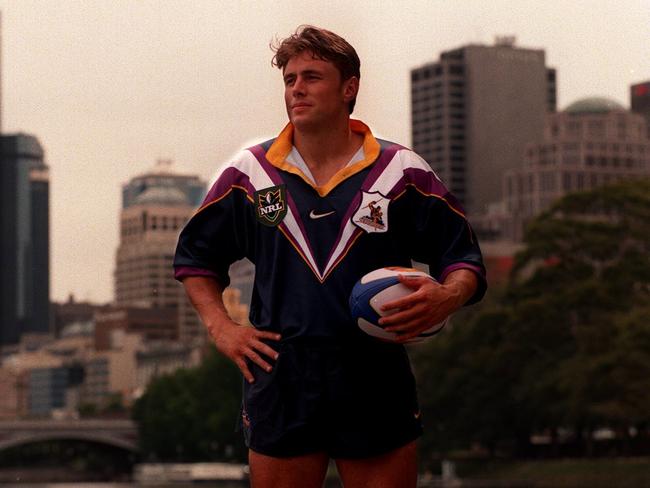
“So I went over there and I was listening on a transistor radio to Mundine and (Nathan) Blacklock doing backflips because they flogged us in the qualifying final.
“The next morning I am in there hiding rum breath and I get the tap on the shoulder. The next week I’m playing in front of 50,000 people.”
Smith came into the team on the wing and Matt Geyer moved to five-eighth as the Storm shook up their line up after losing to the Dragons in their qualifying final.
The changes had the desired effect as they beat Canterbury – Smith kicked four goals in a two point win – and Parramatta to set up a grand final rematch against the Dragons.
THE MAN IN DOUBT
Mundine was one of the most exhilarating players of his generation and he produced one of the best individual performances in a finals match when he scored a treble during St George Illawarra’s 24-8 win against Cronulla in the preliminary final.
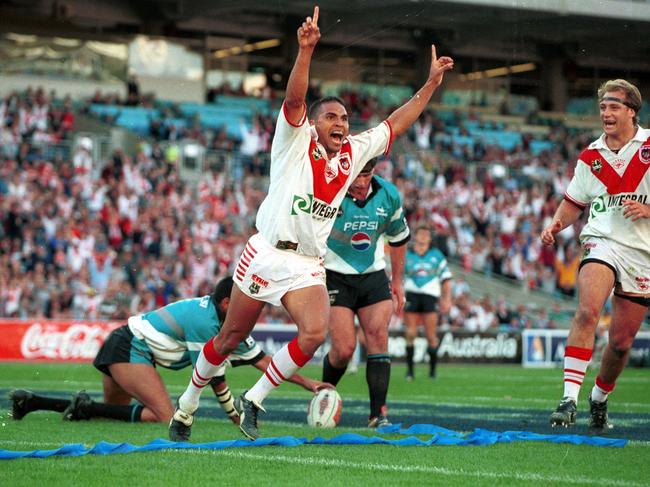
The grand final though was anything but smooth sailing for Mundine, who was the only Dragons player to have tasted premiership success having won a title with Brisbane in 1997.
“Back then I was Superman,” Mundine said.
“But Superman wasn’t at his full strength. After the Cronulla game I got tonsillitis. I didn’t go to the grand final breakfast. I was bedridden for four or five days.
“I thought I wasn’t going to play. I ended up playing but I was only about 60 per cent.
“We played Cronulla on the Sunday and the next day I went to our team doctor Martin Raftery’s house. I stayed at his house for two nights.
“He put me straight on the IV drip and whatever other medicines he had.”
THE COMEBACK
The Storm were down and out at halftime in the grand final at Stadium Australia, as it was then known. A record crowd had turned out and they had seen the Dragons dominate the first half, their performance reflected on the scoreboard.
The Storm were trailing at the break but there was an air of confidence in the sheds as Tawera Nikau vowed to put the side on his back in the second half.
“I say to people continuously, winning a grand final is the greatest thing I achieved in my whole playing career,’’ Brett Kimmorley, the Clive Churchill Medallist, said.
“Being down at halftime was absolutely shattering.
“I remember Lazo speaking to us pre-game and the touch judges knock on the door and say, you’re on and then before we know it, it’s 14-0 nil and you’re shattered at halftime.
“The calmness of Chris (Anderson) at halftime inside the dressing room was outstanding.
“We backed ourselves and then the biggest call in grand final history was that penalty try.
“But it had to have been a penalty try.
“To fly home as the Clive Churchill medallist, I was so very honoured.’’
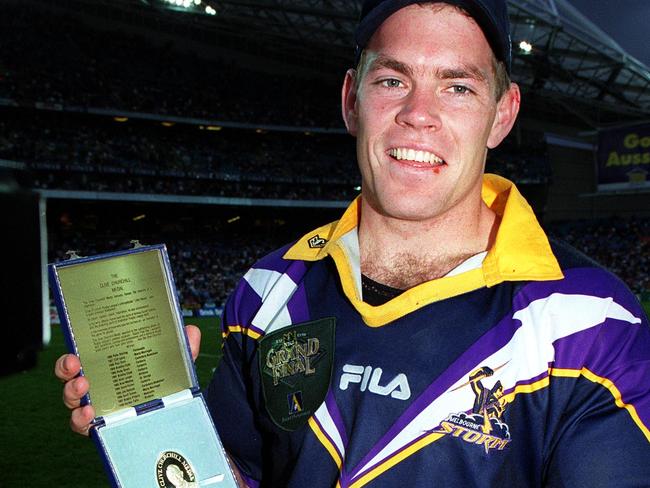
Geyer added: “We just needed to get our groove back and the forwards took it upon themselves in the second half.
“The big fellas just came off the back fence. I know Tawera and Steve (Kearney), the way they came out in that second half, T (Nikau) was trying to do something, whether it was within the rules or outside the rules, he just needed to inspire his team.
“He was just trying to hit everything a bit harder, jolt the ball free or hurt someone.
“That’s when Noddy (Brett Kimmorley) came back into the game and started controlling things with his kicking and passing.”
THE KNOCK ON
Even as Melbourne were mounting a comeback, the Dragons still had the opportunity to put another nail in the Storm’s coffin.
Mundine looked certain to score a try early in the second half when the Dragons were leading by eight. It was Smith’s try-saving effort which halted the play.
“I put the grubber through, regathered,” Mundine said.
“I normally slam the ball down one-handed when I score.
“He knocked me on the top of my head and I was going to plant it down one handed but I thought I had to do two hands to make sure of it. Then I knocked the ball on.
“A lot of people say that cost us the game but we scored shortly after. Mary (Paul McGregor) scored after a kick from Trent Barrett.”
Waite has a slightly different take on Mundine’s no-try.
“If he didn’t duck to avoid the high contact, who knows we might have got our own penalty try,” Waite said.
Smith is remembered for the last-minute try, but his play to jolt the ball from Mundine’s grasp was just as important.
“I just knew he was going to go himself and I just made that call,” Smith said.
“It was wasn’t planned. It was just instinct to go in and it came off.”
THE MOMENT
Melbourne had scored again through Roarty to move within striking distance when, with just over four minutes remaining, Kimmorley put up the kick that would change history.
The kick was pinpoint. Smith only had to catch it and fall over to score. As he took the ball, he was clipped around the ear by Ainscough.
“For 25 years people have said to me, ‘Do you remember?’” Smith said.
“I’ve been knocked out a few times and there have been some times where I can’t remember. But with that one, I can still say I’ve got a photographic memory.
“I can still see the ball coming towards me just saying, ‘This is on the money, all I have to do is catch it’.
“I think that the main impact that probably knocked me out was when I hit my head on the ground … but he certainly did connect my jaw and that was what made me drop the ball.
“Selfishly, I wish I would have been able to get up and at least have had a crack (at goal). It’s a shame that I got knocked out.”
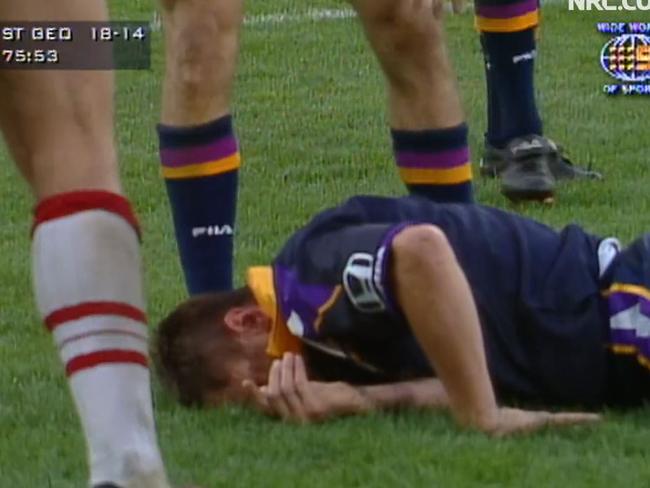
Mundine, who was only metres away, could only watch as Kimmorley’s kick flew over his head.
“When I saw the kick go over – I’m not going to blame Ainsy (Ainscough) or anything, I thought he was too far infield in terms of his positioning,” Mundine said.
“It’s not his fault. He is a legend – one of our premier players that year.”
Waite added: “My first thought – the guy had to do everything possible to stop the try. You can’t change those things. The decision was reasonable.
“You don’t win or lose by a decision like that.
“To talk about it brings the emotion back. I remember not being able to see my loved ones until 8pm. That hurt because you’re dealing with lots of stuff.”
Unlike some, Mundine has watched the game back. He watched the second half as recently as just a few days ago when it was shown on Fox League.
“It still stings especially with my junior club,” Mundine said.
“It hurts man … Sometimes you have to let it go.”
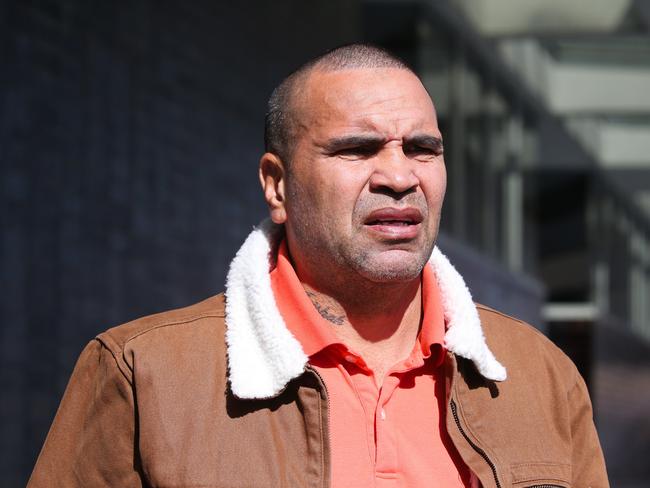
THE DECISION
On-field referee Bill Harrigan is credited with awarding the controversial penalty try. However, the person responsible for making the biggest decision by an official in NRL history, was in fact video referee Chris Ward.
Ward remembers how the drama unfolded like it was yesterday, reaffirming 25-years later that he has never been more confident in making such a monumental call.
“As soon as Bill sent the decision up to me inside the video box, I had no hesitation,’’ Ward said.
“It was a split-second decision that I couldn’t have been more clear on. It was clear-cut.
“It was an easy decision.
“I said to Tim Mander, who was standing beside me as my assistant, ‘That’s a penalty try’. Poor Tim was nervous and said to me, ‘Have another look at it, you can’t be that quick to make a call’.
“So I had another look, but I told him, ‘My answer isn’t going to change, I’m sure of it’.
“We had another look and I said again, ‘Timmy, that’s a penalty try all-day, every day of the week’.
“He then asked me to have one more look. I told him, ‘We don’t need to, but let’s go through it a third time, for you’.
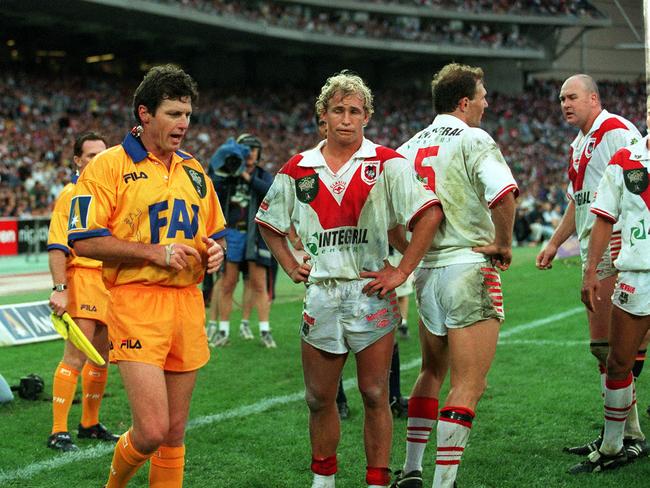
“My decision didn’t change. I spoke to Graeme West upstairs, who was in charge of pressing the button for the big screen and I also spoke to Billy (Harrigan) at the same time.
“I told Bill to go stand under the goalposts because this is going to be a penalty try. He asked me if I was sure, and I told him I couldn’t be more sure.
“I told Graeme to push ‘try’ and Bill will do the rest. The place went berserk.
“I had the media waiting outside the video box waiting for me to come out and then I was invited to the post-match press conference to explain the decision, which was unheard of.
“I still have people talking to me about the decision today.
“But for me, it was straightforward.’’
Remarkably, current Melbourne head of football Frank Ponissi was watching in the crowd in the corner where Smith scored.
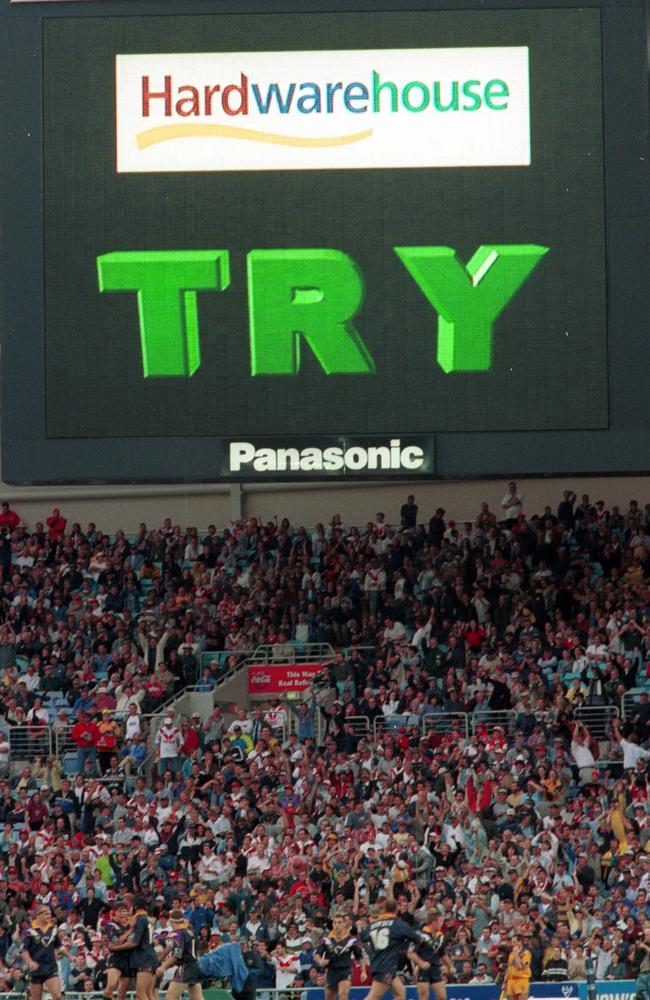
Two years earlier Ponissi had rejected the chance to join Melbourne after the Super League war came to an end.
“I was booked for a flight to go and meet Chris Anderson and John Ribot in late ‘97,” Ponissi said.
“I got halfway to the airport and then I turned around – it was pre-mobile days – and I went to a public telephone box and said, ‘Chris, I ain’t coming’.
“Two years later I was sitting with my late father-in-law and brother-in-law in the corner where that try was scored and I thought to myself I stuffed up then.
“When I got the opportunity eight years later (to join the Storm), I thought I wasn’t going to stuff up again.”
THE FALLOUT
Parramatta and Brisbane have both spun out of control with recent grand final losses.
It was exactly the same for the Dragons. By round 20 the following year, Mundine and Waite were gone.
Mundine had walked out on the sport to pursue boxing, fed up with what he described as injustice as he was continually overlooked for an Australian jersey.
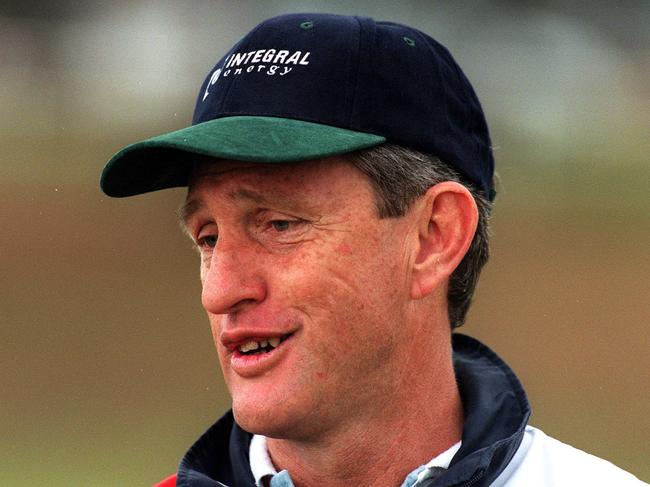
“I was the best player in the world, that’s why missing out hurt so much,” Mundine said.
“I gave the sport everything I had. I was just proud and outspoken and very vocal on certain issues and confident.
“They would’ve had to pick me eventually but the power structure wanted me to see who was boss.”
Waite points out that at least Kevin Walters was able to coach the season out at the Broncos before he was axed.
“We had a good year, a great side and then I was gone in six months,” Waite said.
“I have Kevvie covered.”
While the Dragons spiralled out of control, that win in 1999 became the bedrock for the Melbourne Storm to become a sporting juggernaut.
A few years later Craig Bellamy took control of Melbourne and he has led the Storm to the finals in 21 of his 22 years at the helm.
Throw in three premierships plus a couple that were taken away due to the salary cap scandal and Melbourne can lay claim to being the greatest club in Australian sport.
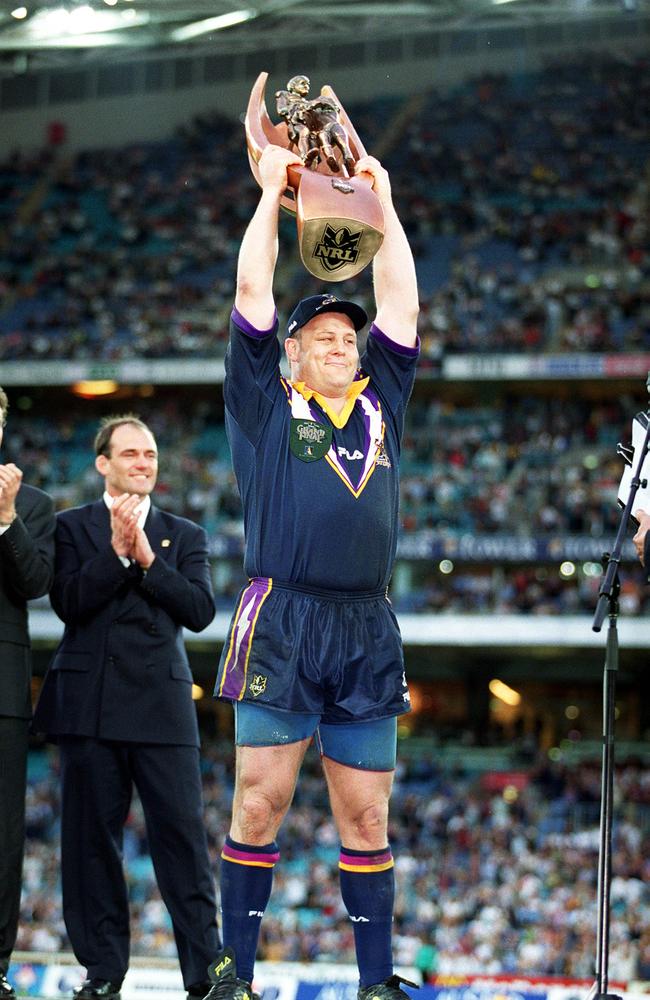
FULL CIRCLE
Tyran Wishart will start Sunday night on the interchange bench for the Storm, just like his father Rod did 25 years ago for the Dragons.
It was Rod’s last game of rugby league for St George Illawarra, the Dragons legend announcing his retirement after the game.
Tyran was born less than two months later and found his way into the Storm system just under two years ago. He has become an invaluable member of the side this season, slotting in when and where required.
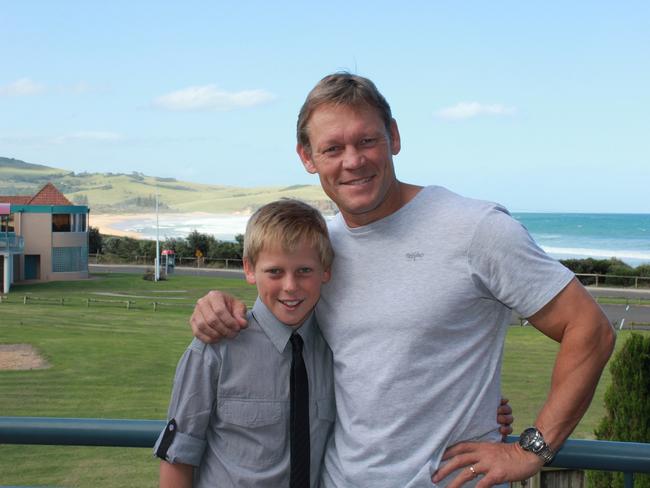
“I saw in some article the other day that they interviewed dad and he reckons mum nearly went into labour when that penalty try was scored,” Tyran Wishart said.
“I love going back and watching dad’s old games. I have watched that one. His last hurrah didn’t go to plan but that is footy.”
Tyran and Rod are both hoping they have a happier ending on Sunday night.
The pair have talked frequently throughout the year and thanks to the Storm, Tyran now has the chance to exorcise the family demons from that disappointment in 1999.
“I talk to him and my whole family throughout the season,” Tyran said.
“Haven’t talked a heap of footy and he is just stoked that not only myself, but the team are in the position and we have given ourselves a chance to have the trophy.”




